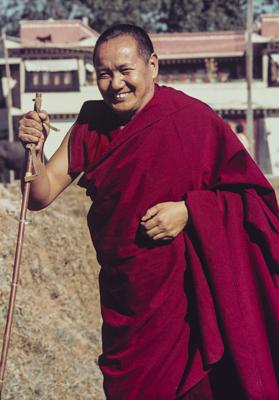New book
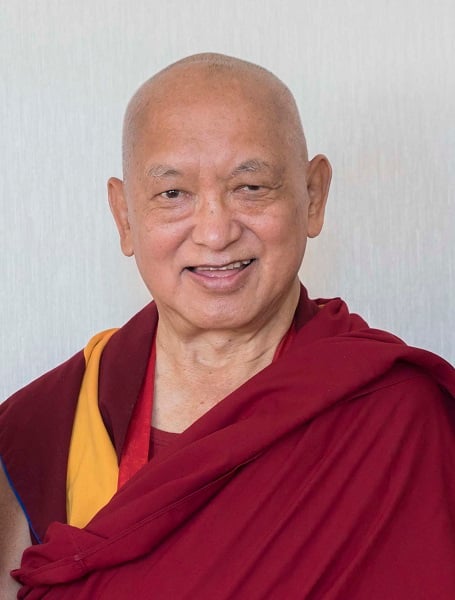 And while Lamrim Year is being printed, we’ll be putting the finishing touches to our next book, The Nectar of Bodhicitta: Motivations for the Awakening Mind, Lama Zopa Rinpoche’s commentaries on selected verses from Khunu Lama Rinpoche’s The Jewel Lamp: A Praise of Bodhicitta and Shantideva’s A Guide to the Bodhisattva’s Way of Life.
And while Lamrim Year is being printed, we’ll be putting the finishing touches to our next book, The Nectar of Bodhicitta: Motivations for the Awakening Mind, Lama Zopa Rinpoche’s commentaries on selected verses from Khunu Lama Rinpoche’s The Jewel Lamp: A Praise of Bodhicitta and Shantideva’s A Guide to the Bodhisattva’s Way of Life.From the Video Archive: Lama Yeshe Offers Immeasurable Blessing Strings
This month from the video archive we are delighted to share this precious footage of Lama Yeshe offering blessing strings to the many fortunate Western students receiving teachings on mahamudra from His Holiness the Dalai Lama during the first Enlightened Experience Celebration in Dharamsala, India, in March 1982. Filmed by Robyn Brentano with blessing strings sequence filmed by Roland Stutz, digitized by Ven. Bob Alcorn, edited by Megan Evart. We invite you to learn more about these epic events in Big Love: The Life and Teachings of Lama Yeshe, Volume 2, p. 1004. You can also learn more about the first Enlightened Experience Celebration here on our website.
Visit and subscribe to the LYWA YouTube channel to view dozens more videos freely available from our archive. See also the FPMT YouTube channel for many more videos of Lama Zopa Rinpoche’s teachings.
New on the LYWA Podcast: The Useful Fear of Death
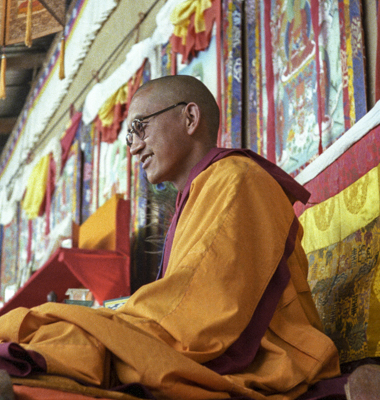 Once we are free from delusion and karma, there is no cause for fear, so we are free from fear forever.
Once we are free from delusion and karma, there is no cause for fear, so we are free from fear forever.
—Lama Zopa Rinpoche
This month on the LYWA podcast are teachings given by Lama Zopa Rinpoche at the 36th Kopan Meditation Course, held at Kopan Monastery, Nepal, in 2003. In this session, Rinpoche explains how to use our fear of death as a potent cause of taking refuge in the Buddha, Dharma and Sangha. Read the lightly edited transcript of these teachings on our website.
The LYWA podcast contains hundreds of hours of audio, each with links to the accompanying lightly edited transcripts. See the LYWA podcast page to search or browse the entire collection by topic or date, and for easy instructions on how to subscribe.
WHAT'S NEW ON OUR WEBSITE
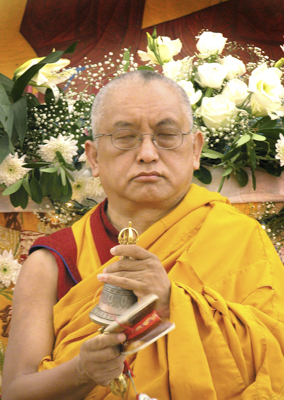 This month we have posted Ultimate Wisdom: Actualizing the Path to Cessation, a teaching given by Lama Zopa Rinpoche at Istituto Lama Tzong Khapa, Pomaia, Italy, in June 2014. In this teaching, Rinpoche advises that we can never find satisfaction in samsara (cyclic existence), thus realization of emptiness is the most important goal in our life so that we can cease suffering and its cause.
This month we have posted Ultimate Wisdom: Actualizing the Path to Cessation, a teaching given by Lama Zopa Rinpoche at Istituto Lama Tzong Khapa, Pomaia, Italy, in June 2014. In this teaching, Rinpoche advises that we can never find satisfaction in samsara (cyclic existence), thus realization of emptiness is the most important goal in our life so that we can cease suffering and its cause.
This month in our featured short video from FPMT's Essential Extracts series, Lama Zopa Rinpoche gives advice to young people during a television interview in Darkhan, Mongolia. Rinpoche says it is most important to learn Dharma, to learn about the mind. Equally important is practicing the good heart in everyday life, as well as patience and contentment. You can find links to the video here, or visit FPMT’s Essential Extracts webpage to browse the entire collection.
We also have new additions to Lama Zopa Rinpoche's Online Advice Book to share with you:
- You Will Meet Again and Again: Rinpoche sent this letter to a student’s father, whose wife had recently passed away.
- Experience the Suffering for Sentient Beings: This advice about tonglen practice was given to a student who had punctured their lungs in a fall and was in hospital.
- Meditations for Depression: Rinpoche recommended emptiness meditation in this letter to a student who was feeling depressed after a family member passed away.
- The Antidote to Poverty: A student wrote that they couldn’t make money and were unable to escape poverty. Rinpoche advised the student to recite the Heart Sutra and to make charity with a pure heart, helping others as much as possible.

Nick Ribush
Director
THIS MONTH'S TEACHING: Lama Zopa Rinpoche on the Nectar of Bodhicitta
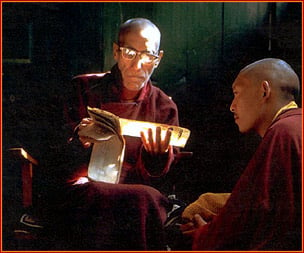 The nectar of bodhicitta destroys the poison of self-cherishing
The nectar of bodhicitta destroys the poison of self-cherishing
Khunu Lama Rinpoche says,
[162] How could a living being
Who possesses the ornament of bodhicitta
Ever have ill will toward others?
A bodhisattva abandons ill will naturally, without persuasion.
When we wear the ornament of bodhicitta there is no way we could ever harbor ill will toward any other being, no matter what that being might do to us. This is the power of bodhicitta. Our mind only ever thinks of benefiting other living beings, instinctively, spontaneously, without being told to do it. Destroying our own self-cherishing, we no longer harm others and because of that we are protected from harm ourselves.
The self-cherishing attitude is the creator of all hindrances. With it, we are constantly beset with problems; without it there can be no external problems because there are no internal disturbances. With a good heart, not even the realization of bodhicitta, we have no enemies because enemies are self-created. Whoever we meet, they are only friends. Because of our good heart we induce goodness in others. With loving kindness, with strong concern for others, we influence everyone around us, softening others’ attitudes, bringing them to have thoughts of loving kindness. Rather than being ruled by self-interest and only creating negative karma by trying to grab what we want—and creating enemies and unpleasant situations in doing so—we only help others, protecting them from harm and in doing so we ourselves are protected from harm. Even extremely selfish people are influenced by our loving, caring attitude and become less selfish as a consequence.
A classic example of this is Lama Yeshe. Because of Lama’s great attitude of loving kindness and bodhicitta, people who met Lama, even though normally they might have quite a negative personality, became good people around him. Toward others they might still be quite negative, selfish, impatient, with uncontrolled minds, but in Lama’s presence they changed and were very loving to Lama and would never think of harming him. So, Lama never found an enemy, a bad person, because Lama himself had that personality, being kind to everybody, being concerned with everybody. Being in Lama’s kind presence, others naturally became kind. Just seeing Lama’s holy body, just hearing Lama’s holy words, their negative thoughts were subdued.
How we perceive somebody, as friend or enemy, is completely dependent on our own mind. How that person acts toward us, as a friend or enemy, is also up to us, up to our attitude. With a self-cherishing attitude we cultivate enemies, whereas by developing a mind of loving kindness and bodhicitta our world will be full of friends and we will never harm others or be harmed by them. This shows how extremely important it is to change our attitude from self-cherishing to cherishing others.
Whether we accept reincarnation or not, whether we accept the need for refuge in the Buddha, Dharma and Sangha, we must accept this basic fact, that as long as we want happiness and to only have friends we must renounce self-cherishing, the creator of all hindrances. With a good heart, we are treated kindly. People wish us health and a long life and like us, regardless of whether we are wealthy or poor. Until we have attained bodhicitta, however, there will always be some problems, therefore it is vital to do whatever we can to cultivate this most precious mind.
Bodhicitta is like nectar that destroys the poison of self-cherishing. Of this, Khunu Lama Rinpoche says,
[257] When you have bodhicitta
You see self-cherishing as poison and stop it.
When you have bodhicitta
You see cherishing others as nectar and embrace it.
Because self-cherishing is the most dangerous thing, we ordinary beings must be incredibly careful in this samsaric environment. Bodhisattvas, on the other hand, can live in samsara without being poisoned by it. In the Wheel-Weapon Mind Training, the great yogi Dharmarakshita offers the beautiful metaphor of peacocks that feed on poisonous plants and are not only unharmed but in fact the glory of their tailfeathers is enhanced as a result. In the same way, samsara is poison for beings overcome with self-cherishing but bodhisattvas thrive on it, for here is the field where they can most quickly develop to full enlightenment. Dharmarakshita says,
When the peacocks roam the jungle of virulent poison,
The flocks take no delight in gardens of medicinal plants,
No matter how beautiful they may be,
For peacocks thrive on the essence of virulent poison.Similarly, when the heroes roam the jungle of cyclic existence,
They do not become attached to the garden of happiness and prosperity,
No matter how beautiful it may be,
For heroes thrive in the jungle of suffering.
No matter how beautiful the flowers and fruit of the plants in the medicinal gardens are, the peacocks have no attraction for them. Instead they eat the poisonous plants, thriving on what would make us sick, becoming healthy and magnificent as a result. Similarly, bodhisattvas shun a life of luxury and self-indulgence and thrive on working tirelessly for others, no matter how difficult it may be. These brave ones are not attracted at all by pleasure.
Excerpted from the forthcoming The Nectar of Bodhicitta. Compiled and edited by Gordon McDougall.
























